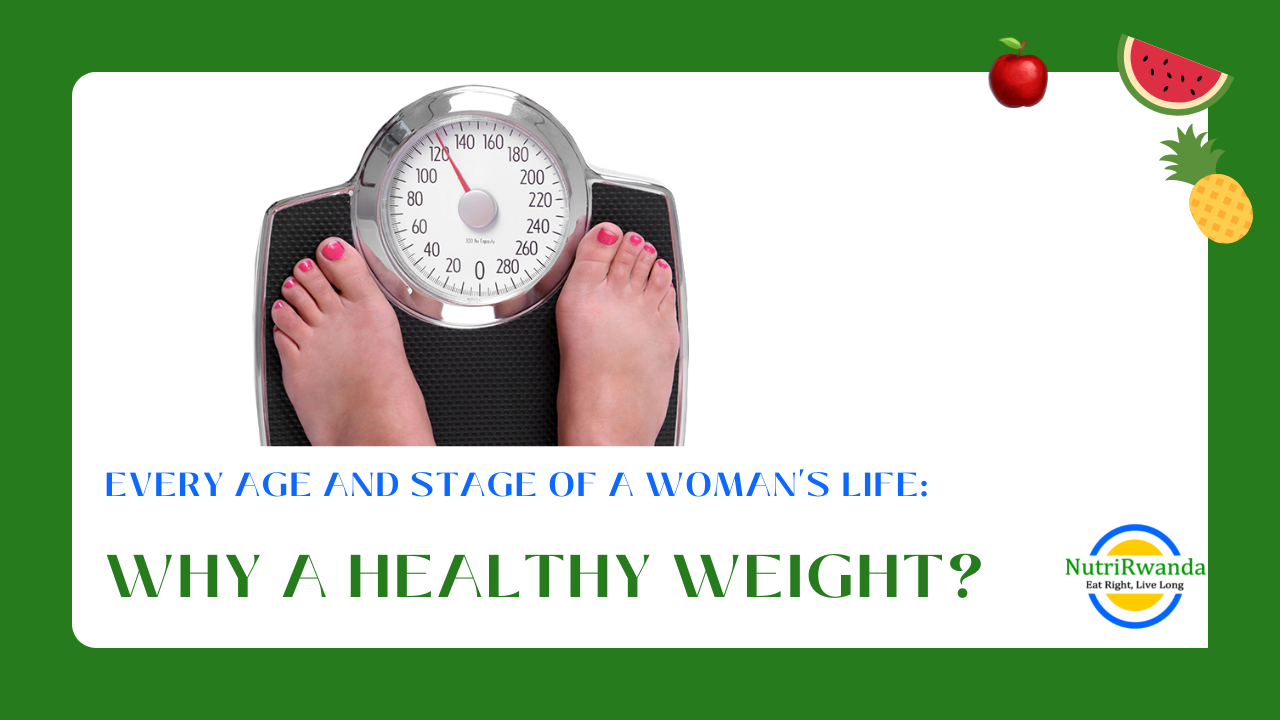We often take it for granted, but good health is one of the most precious gifts of life. A healthy weight, maintained throughout life, helps you achieve good health in many ways: look your best, feel your best, and reduce your risk for many serious and ongoing diseases
Overweight and obesity are epidemics. According to the 2019-20 Rwanda Demographic Health Survey, 26 per cent of adult Rwanda women are obese, and many more are overweight, up significantly over the past two decades! Young and adult women are increasingly overweight, too, from 12% in 2005 and 16% in 2010 to 21% in 2014-15 and 26% in 2019-20.
What is a healthy weight?
It’s the weight that’s best for you, not necessarily the lowest weight you think you can be. A healthy weight actually is a range that’s statistically related to good health. Being above or below that range increases the risk of health problems, or decreases the likelihood of good health
So what’s your healthy weight? That depends. Determining your right weight takes several things into account: (1) your body mass index, or your weight in relation to your height; (2) the location and amount of body fat you have; and (3) your overall health and risks for weight-related problems such as diabetes or high blood pressure.
Body Mass Index (BMI)
Body mass index (BMI) is a number based on body weight in relation to your height indicates how much your weight affects your risks for weight-related health problems. Body Mass Index is a simple calculation using a person’s height and weight. The formula is BMI = kg/m2 where kg is a person’s weight in kilograms and m2 is their height in meters squared. A BMI of 25.0 or more is overweight, while the healthy range is 18.5 to 24.9.
For girls….
A healthy weight not overweight during childhood offers protection for the long term: protecting them from adult obesity and type 2 diabetes and helping blood cholesterol and triglyceride levels stay at healthy levels. During the growing-up years, a healthy weight boosts self-esteem, important for emotional, mental, and social development. Overweight increases the chance of early puberty.
For teen and young adult women . . .
As with girls, a healthy weight not overweight reduces the chances of adult obesity later and helps ensure a healthy pregnancy and nursing. Beyond that, maintaining a healthy weight promotes physical health in other ways: lower
risk for high blood cholesterol levels, type 2 diabetes, and high blood pressure; less arthritis risk in later life; and perhaps easier breast cancer detection. On the flip side, a healthy weight not underweight helps teens and young women develop and maintain strong bones for peak bone mass. For emotional health, a healthy weight feels good and boosts self-esteem.
The benefits of a healthy weight mirror those of the teen and young adult years. In addition, a healthy weight promotes fertility and helps reduce the risk for gallbladder disease. For pregnant and breast-feeding women, most important, healthy weight gain (not dieting) helps
For women in their child-bearing years . . .
Ensure a healthy pregnancy: promotes normal fetal development and improves the chances of a healthy,
full-term birth. When maternal weight is healthy, childbirth is easier and safer. Obesity increases the risk for high blood pressure, gestational diabetes, induced labor, and cesarean sections. Maternal obesity may affect a child’s health in other ways, too, including increased risk for childhood obesity. During breastfeeding, a healthy weight helps maintain the quality
and volume of breast milk. A healthy weight during pregnancy and breastfeeding lowers a woman’s risk
for obesity later.
For women after menopause . . .
As before, a healthy weight protects against some health problems, including breast cancer, some other cancers, heart disease, and diabetes. Among other benefits, helping to prevent risky abdominal weight gain, as weight shifts after menopause. As always, a healthy weight feels good!
For older women . . .
A healthy weight continues to protect against some cancers, heart disease, and type 2 diabetes. A healthy weight—not underweight, helps bones remain strong, cushions bones and organs from fracture and another injury (in case of a fall), and protects against wasting related to serious illness
Now consider the upside: the health benefits of trimming down. If you need to lose, dropping 5 to 15 per cent of your body weight may improve your health and quality of life, and prevent these health problems. For someone who weighs 90 Kg, that’s a loss of 4.5 to 14 Kg. Even this small weight shift can help lower the risk factors for many chronic diseases: lower blood pressure, total and LDL blood cholesterol levels, triglyceride levels, and blood sugar. In addition, HDL cholesterol levels may go up
